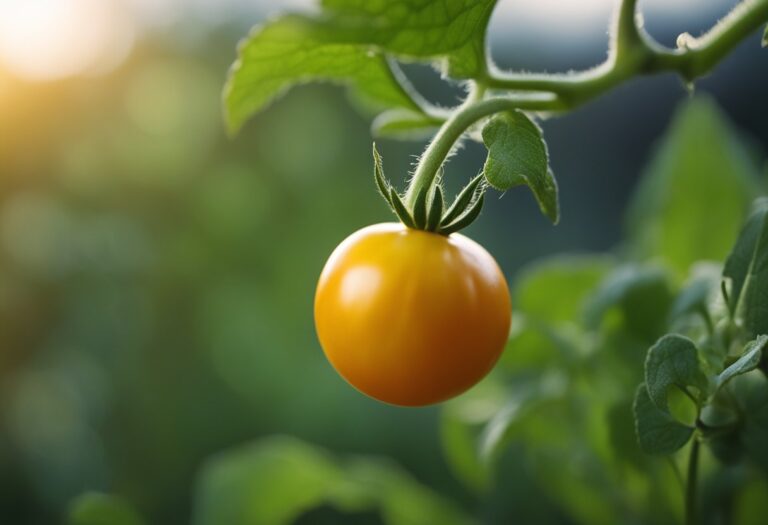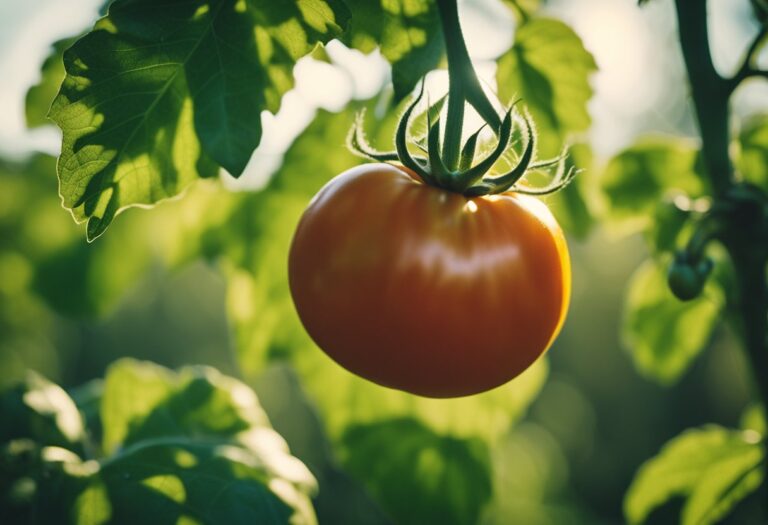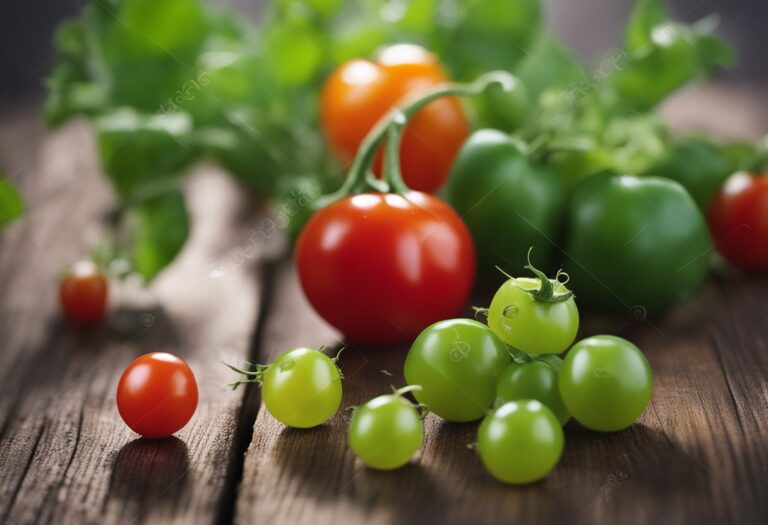What Not to Plant Near Tomatoes: Tips for a Healthy Garden
If you’re planning on growing tomatoes in your garden, it’s important to know which plants to avoid planting near them. Some plants can actually harm your tomato plants by competing for nutrients, attracting harmful insects, or even spreading disease. Understanding which plants to avoid planting near tomatoes can help ensure a healthy and thriving garden.
Companion planting is the practice of planting certain plants together to benefit each other. However, not all plants are compatible with each other, and some can even be harmful to each other.
When it comes to tomatoes, there are several common plants to avoid planting near them, including cabbage, corn, fennel, and potatoes. These plants can stunt the growth of your tomato plants or attract pests that can harm them.
Key Takeaways:
- Knowing which plants to avoid planting near tomatoes can help ensure a healthy and thriving garden.
- Common plants to avoid near tomatoes include cabbage, corn, fennel, and potatoes.
- Companion planting can be beneficial, but it’s important to understand which plants are compatible with each other.
Understanding Companion Planting
Companion planting is the practice of planting specific crops in close proximity to each other to enhance nutrient uptake, provide pest control, encourage pollination, and increase crop production. In other words, it’s about planting different plants together that will benefit each other.
When it comes to tomatoes, choosing the right companion plants is important for their growth and health. Some plants can help to repel pests that may harm your tomato plants, while others can provide them with the nutrients they need to thrive.
However, it’s also important to know what not to plant near tomatoes. Some plants can compete with tomatoes for nutrients or attract pests that can harm them. For example, members of the Brassica family, such as cabbage and broccoli, should not be planted near tomatoes as they are heavy feeders and can deplete the soil of nutrients that tomatoes need to grow.
Here are a few other plants that you should avoid planting near tomatoes:
- Nightshade plants, such as peppers and eggplants, can attract the same pests that attack tomatoes.
- Corn can attract tomato fruitworms, which can harm both crops.
- Fennel can inhibit the growth of tomatoes and attract pests that can harm them.
By understanding companion planting and avoiding certain plants that can harm your tomatoes, you can help to ensure a healthy and productive harvest.
Common Plants to Avoid Near Tomatoes
When it comes to planting a vegetable garden, knowing which plants grow well together is just as important as knowing which ones don’t. If you’re planning on growing tomatoes, there are a few plants that you should avoid planting nearby.
Cabbage Family
The cabbage family, also known as the brassicas, includes plants like broccoli, cauliflower, and cabbage.
These plants are not good companions for tomatoes because they are heavy feeders and can compete with tomatoes for nutrients. Additionally, brassicas produce chemicals that can inhibit the growth of tomatoes.
Corn
While corn may seem like a harmless plant to grow in your garden, it’s not a good companion for tomatoes. Corn is a heavy feeder, which means it can deplete the soil of nutrients that tomatoes need. Additionally, corn attracts a pest called the tomato fruitworm, which can damage tomato plants.
Fennel
Fennel is a popular herb that is often used in cooking, but it’s not a good companion for tomatoes. Fennel produces a chemical called anethole, which can inhibit the growth of tomato plants.
Additionally, fennel attracts a pest called the tomato hornworm, which can damage tomato plants.
Potatoes
Potatoes and tomatoes are both members of the nightshade family, but they shouldn’t be planted near each other. Potatoes can attract pests like the Colorado potato beetle, which can also damage tomato plants. Additionally, both plants are heavy feeders and can compete with each other for nutrients.
Remember, planting the wrong plants near your tomatoes can lead to stunted growth, reduced yield, and pest problems. By avoiding these common plants, you can help your tomatoes grow strong and healthy.
Why Some Plants Are Incompatible
When it comes to planting tomatoes, it’s important to choose your plant companions carefully. Some plants are incompatible with tomatoes and can cause stunted growth, reduced yield, or even death of the tomato plant.
One reason for incompatibility is competition for resources. For example, plants with deep roots can compete for water and nutrients with tomato plants. This can lead to reduced growth and yield for both plants.
Another reason for incompatibility is allelopathy, which is when one plant produces chemicals that can harm another plant. Some plants, such as fennel, can produce chemicals that inhibit the growth of tomato plants.
It’s also important to consider pest and disease issues when choosing plant companions. Some plants are more susceptible to certain pests and diseases than others. For example, planting tomatoes next to corn can attract tomato fruitworms, which can damage both crops.
To ensure a healthy and productive tomato crop, it’s best to choose plant companions that are compatible with tomatoes. Some good options include basil, marigolds, and peppers.
| Plant Companions | Incompatible Plants |
|---|---|
| Basil | Fennel |
| Marigolds | Brassicas (cabbage, broccoli, etc.) |
| Peppers | Corn |
| Carrots | Dill |
By choosing compatible plant companions and avoiding incompatible ones, you can help ensure a successful tomato harvest.
Beneficial Alternatives to Plant
If you’re looking for plants that can benefit your tomatoes, consider planting basil and other herbs, marigolds, and garlic.
Basil and Other Herbs
Basil and other herbs, such as parsley and thyme, are great companion plants for tomatoes. They can help repel pests, attract beneficial insects, and improve the flavor of your tomatoes.
Plus, they’re easy to grow and can be harvested throughout the season. Consider planting them in pots near your tomato plants or interplanting them in your garden.
Marigolds
Marigolds are another great companion plant for tomatoes. They can help repel nematodes, which are microscopic worms that can damage tomato roots.
Plus, they’re easy to grow and can add a pop of color to your garden. Consider planting them around the perimeter of your tomato plants or interplanting them throughout your garden.
Garlic
Garlic is a natural insect repellent and can help keep pests away from your tomato plants. Plus, it’s easy to grow and can be harvested throughout the season. Consider planting it near your tomato plants or interplanting it throughout your garden.
Remember, when choosing companion plants for your tomatoes, it’s important to consider their growing requirements and compatibility with your tomatoes. With these beneficial alternatives, you can help your tomato plants thrive and enjoy a bountiful harvest.
Planning Your Tomato Garden Layout
When planning your tomato garden layout, keep in mind that some plants should not be grown near tomatoes. This is because they can attract pests or compete for nutrients, which can stunt the growth of your tomato plants.
To ensure a healthy and thriving tomato garden, here are some plants to avoid planting near your tomatoes:
- Brassicas: Members of the brassica family, such as cabbage, broccoli, kale, and cauliflower, are heavy feeders and can take away nutrients from your tomato plants. This can cause your tomato plants to become stunted or even die. Avoid planting brassicas near your tomatoes.
- Alliums: Plants in the allium family, including onions, garlic, chives, and leeks, can also attract pests that can harm your tomato plants. They release a chemical that can stunt the growth of your tomatoes. Keep them away from your tomato plants.
- Fennel: Fennel is not a good companion plant for vegetables. It releases chemicals that can inhibit the growth of nearby plants, including tomatoes. Keep fennel away from your tomato plants.
By planning your tomato garden layout carefully and avoiding planting these plants near your tomatoes, you can ensure a healthy and bountiful harvest.
Frequently Asked Questions
Why should cucumbers not be planted near tomatoes?
Cucumbers and tomatoes should not be planted together because they both require similar nutrients to grow. Growing them together can lead to competition for nutrients, which can result in stunted growth and poor yields.
Additionally, cucumbers are susceptible to fungal diseases, which can spread to nearby tomato plants.
What are the risks of planting tomatoes close to cabbage?
Tomatoes and cabbage are not good companions because they both attract similar pests, including aphids and whiteflies. Planting them together can lead to an infestation of these pests, which can damage both crops.
Additionally, cabbage is a heavy feeder and can deplete the soil of nutrients, which can affect the growth of nearby tomato plants.
Can onions have a negative effect on nearby tomato plants?
Onions and other members of the allium family, including garlic and shallots, can have a negative effect on nearby tomato plants.
They release a chemical called allicin, which can stunt the growth of tomato plants and make them more susceptible to disease.
What types of marigolds are beneficial to plant with tomatoes?
French marigolds are the most beneficial type of marigold to plant with tomatoes. They release a chemical called alpha-terthienyl, which repels harmful nematodes and other pests that can damage tomato plants.
Additionally, their bright flowers can attract beneficial insects, such as ladybugs and lacewings, which can help control pests.
Are there any disadvantages to growing potatoes near tomatoes?
Growing potatoes near tomatoes can lead to competition for nutrients, which can affect the growth of both crops. Additionally, potatoes are susceptible to a disease called late blight, which can spread to nearby tomato plants and cause them to wilt and die.
What vegetables are known to be poor companions for tomatoes?
Vegetables that are known to be poor companions for tomatoes include members of the brassica family, such as broccoli, cauliflower, and cabbage, as well as members of the nightshade family, such as peppers and eggplants.
These plants require similar nutrients to tomatoes and can compete for resources, which can affect the growth of all the plants involved.



